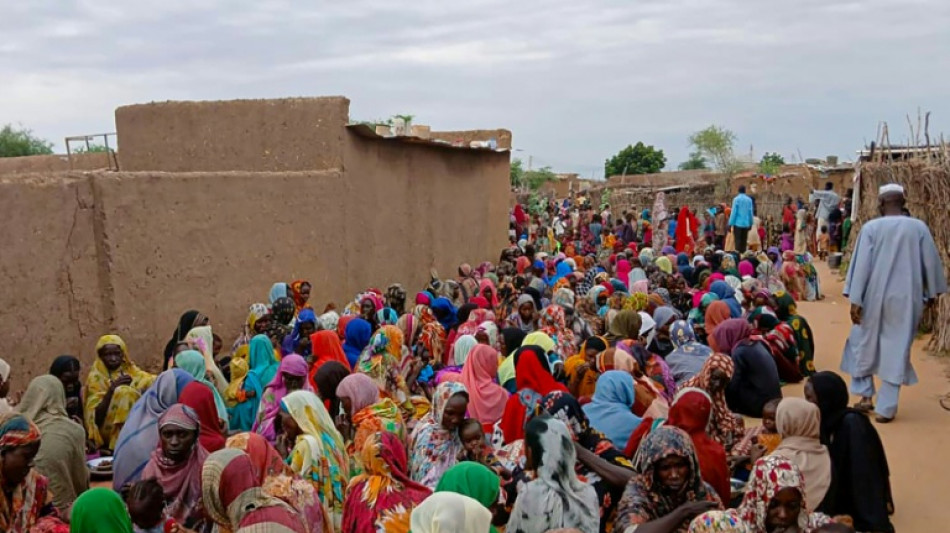
SCS
0.0200

The army-aligned governor of Sudan's Darfur region called for the protection of civilians in the stricken city of El-Fasher on Monday, after paramilitaries claimed to have seized it following a brutal 18-month siege.
Pro-democracy activists reported fighting "in the vicinity of El-Fasher airport and several areas west of the city".
The group, known as a local resistance committee, said in a statement there was a "complete absence of air support" to protect residents.
The Rapid Support Forces said on Sunday they had captured the city, the last state capital in the vast Darfur region yet to fall to the paramilitaries.
Communications remain cut across the city, including satellite networks, leaving El-Fasher in a "media blackout", according to the Sudanese Journalists' Syndicate.
The United Nations's migration agency said 2,500 to 3,000 people fled El-Fasher on Sunday, seeking safety within the city or westward to Tawila and Mellit towns.
Darfur governor Minni Minnawi, who is allied with the Sudanese army, on Monday called for the "protection of civilians" and "an independent investigation into the violations and massacres carried out by the militia away from public view", referring to the RSF.
Sudan's de facto leader, Abdel Fattah al-Burhan, appeared publicly on Sunday night but only for a meeting with the Turkish ambassador in Port Sudan.
The army-led Transitional Sovereignty Council said they discussed the "siege imposed by the terrorist Rapid Support militia on El-Fasher."
Tom Fletcher, head of the UN Office for the Coordination of Humanitarian Affairs (OCHA), called for safe passage for civilians trapped in the fighting.
Access to the city remains severely restricted due to ongoing combat.
- Atrocities -
Despite RSF assurances of civilian protection, the local resistance committee accused the group of committing atrocities, saying that since Sunday, innocent civilians had suffered "the worst forms of violence and ethnic cleansing."
The journalists' syndicate expressed "deep concern for the safety of journalists" in El-Fasher, saying that independent reporter Muammar Ibrahim has been held by RSF forces since Sunday.
A video circulated by the RSF appeared to show fighters detaining dozens of men in civilian clothing accusing them of supporting the army and the Joint Forces.
The Joint Forces is an alliance of armed groups which has fought alongside the military since late 2023, when RSF fighters massacred between 10,000 and 15,000 members of the non-Arab Masalit community in the capital of West Darfur, El-Geneina.
Since August, the RSF has intensified artillery and drone attacks on El-Fasher, gradually eroding the army's last defensive positions.
If confirmed, the city's capture would mark a significant turning point in Sudan's two-year war, which has killed tens of thousands and displaced nearly 12 million people.
It would give the RSF control over all five state capitals in Darfur, consolidating its parallel administration in Nyala, and potentially partitioning Sudan, with the army holding the north, east, and centre, and the RSF dominating Darfur and parts of the south.
Around 260,000 civilians, half of them children, remain in El-Fasher without aid.
Four UN agencies said that thousands of malnourished children are at "imminent risk of death" amid the collapse of health services, while killings, sexual violence and forced recruitment continue.
Famine was declared earlier this year in several displacement camps around the city, with the UN warning it could spread to El-Fasher where residents have resorted to eating animal fodder.
The UN has also warned of potential massacres targeting non-Arab communities, echoing atrocities after the RSF captured Zamzam camp in April.
Elsewhere, fighting also intensified in North Kordofan's Bara city, in central Sudan, which the RSF regained from the army on Saturday.
The Emergency Lawyers, a war-monitoring group, accused the RSF of a "horrific massacre" following the army's withdrawal, reporting mass executions that killed hundreds, primarily young residents, alongside arrests, looting and destruction of property amid a total communications blackout.
Now well into its third year, the war has spiralled into what the United Nations describes as the world's largest displacement and hunger crisis. Despite international calls for a ceasefire, both sides remain unwilling to negotiate.
B.Hornik--TPP